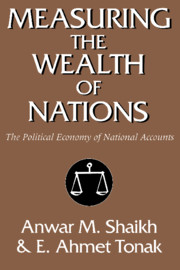Book contents
- Frontmatter
- Contents
- List of figures
- List of tables
- Preface
- 1 Introduction
- 2 Basic theoretical foundations
- 3 Marxian categories and national accounts: Money value flows
- 4 Marxian categories and national accounts: Labor value calculations
- 5 Empirical estimates of Marxian categories
- 6 A critical analysis of previous empirical studies
- 7 Summary and conclusions
- Appendices
- References
- Author index
- Subject index
Preface
Published online by Cambridge University Press: 09 February 2010
- Frontmatter
- Contents
- List of figures
- List of tables
- Preface
- 1 Introduction
- 2 Basic theoretical foundations
- 3 Marxian categories and national accounts: Money value flows
- 4 Marxian categories and national accounts: Labor value calculations
- 5 Empirical estimates of Marxian categories
- 6 A critical analysis of previous empirical studies
- 7 Summary and conclusions
- Appendices
- References
- Author index
- Subject index
Summary
This book has been a long time in the making. The interest in providing an empirical framework that would correspond to Marxian categories dates back to 1972–73, when Anwar Shaikh first discovered Shane Mage's pathbreaking work and developed an alternate schema and an alternate set of estimates based on Mage's own data.
In 1974 Shaikh came across Edward Wolff's working paper on input output-based estimates of the rate of surplus value in Puerto Rico. This added a new dimension to the problem. Mage's work emphasized the significance of the distinction between productive and unproductive labor, but it was restricted to only the value-added side of national income accounts. On the other hand, whereas Wolff's work was located within the more comprehensive double-entry framework of input-output accounts, it did not distinguish between productive and unproductive labor. This led Shaikh to attempt to develop a comprehensive framework for Marxian categories which made both distinctions simultaneously.
The procedure that emerged in 1975 was essentially the same one used in this book: a mapping between Marxian and input-output categories illustrated by means of a continuing numerical example in which both total price (the sum of purchasers' prices) and the magnitudes of the aggregate value flows (total value and its basic components) were held constant, while the associated money forms became ever more complex as more concrete factors were considered.
- Type
- Chapter
- Information
- Measuring the Wealth of NationsThe Political Economy of National Accounts, pp. xv - xviiiPublisher: Cambridge University PressPrint publication year: 1994

